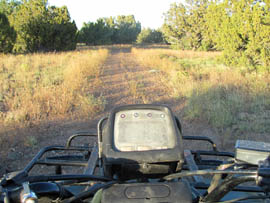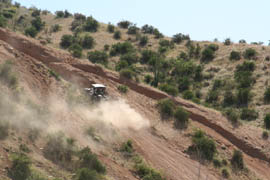Cronkite News has moved to a new home at cronkitenews.azpbs.org. Use this site to search archives from 2011 to May 2015. You can search the new site for current stories.
Lawmaker targets state OHV law enforcement in national forests
PHOENIX – Under a state law that took effect in 2009, an Arizona Game and Fish Department officer enforcing hunting laws on federal land is supposed to stop someone from riding an off-highway vehicle in an area closed to OHV use.
To Jack Husted, chairman of the Arizona Game and Fish Commission, that requirement takes away from an officer’s duties, which also include enforcing state laws on fishing and boating safety.
“We don’t think that a federal rulemaking body should be able to make rules and make a state peace officer enforce those rules for them,” he said.
Sen. Chester Crandell, R-Heber, has authored legislation that would remove areas governed by federal agencies from the scope of the state’s law on OHV use. At present, the law applies to roads, trails, routes or areas closed to OHVs or designated for OHV use by federal agencies, the state, a county or a municipality.
Crandell’s legislation, a strike-everything amendment to HB 2551, won an endorsement Thursday from the Senate Committee of the Whole, setting up a vote by the full Senate that would send it back to the House to consider the changes.
Concerns raised by Crandell and Husted center on the U.S. Department of Agriculture’s 2005 Travel Management Rule, which requires national forests and grasslands to designate which roads, trails and areas are open to motor vehicle use.
Crandell said state tax dollars shouldn’t go toward enforcing federal rules.
“I think the issue is the unfunded mandate that we have roads here that we expect you to enforce and take care of and we’re not going to put any money into it,” Crandell told the Senate Government and Environment Committee on March 21. “It’s your job to follow our rules that we’ve put in place and, by the way, you’re going to have to do it with your own resources to take care of that.”
Husted said Game and Fish considers the new travel-management plans implemented and under consideration by Arizona’s six national forests to be a burden for the officers and the public. The process left the forests with different rules, making those rules nearly impossible to enforce, he said.
Husted said Game and Fish issued a statement telling officers that enforcing OHV laws in areas closed by national forests isn’t a high priority.
“To enforce those rules that they promulgated, it’s going to be a gargantuan effort,” Husted said. “And that’s one of those things where every time you create a rule, you need to look at the enforceability.”
Jim Paxon, chief information officer for Game and Fish, said the department has 148 commissioned officers, seven of whom specialize in OHV safety and law enforcement. All commissioned officers have the authority to enforce federal laws related to OHVs, though officers often educate riders about regulations before issuing citations.
“Law enforcement is intended to educate and inform and change the way people act,” Paxon said. “They don’t always write tickets, but they’re authorized to.”
Sandy Bahr, director of the Sierra Club’s Grand Canyon chapter, said that most OHV use occurs in national forests and that those areas will suffer if Game and Fish officers stop enforcing OHV laws there.
“If they’re not enforcing the off-highway vehicle provisions then the lands are getting trashed without enforcement action,” Bahr said. “If people are destroying an archeological site, are they going to not enforce? If they’re ripping up a riparian area, are they not going to enforce?”
The Forest Service hasn’t taken a position on Crandell’s bill.
Cathie Schmidlin, a regional spokeswoman for the Forest Service, said that agency officials have always realized that it is the responsibility of federal officers to enforce OHV laws on federal land. With 30 Forest Service officers available in Arizona, she said it’s important to educate the public about the importance of following the rules in travel-management plans.
Game and Fish was included in discussions about each national forest’s travel management plan, but Husted said the department’s suggestions should have had more weight since state dollars are used to enforce the plans.
Paxon said the Game and Fish Commission hopes that Crandell’s bill will bring the federal government back to the table.
“What we are desiring is an outcome where we are included in the actual consideration of laws that impact state citizens and residents and recreationists that are out there using those federal lands,” he said.
Ian Dowdy, conservation outreach associate with the Arizona Wilderness Coalition, said that the state and federal governments need to work together to maintain public resources so that everyone can enjoy national forests.
“There needs to be a balance between folks who can access the land and protecting the resource, because if the resource is degraded then it won’t be viable for outdoor recreation,” he said.








